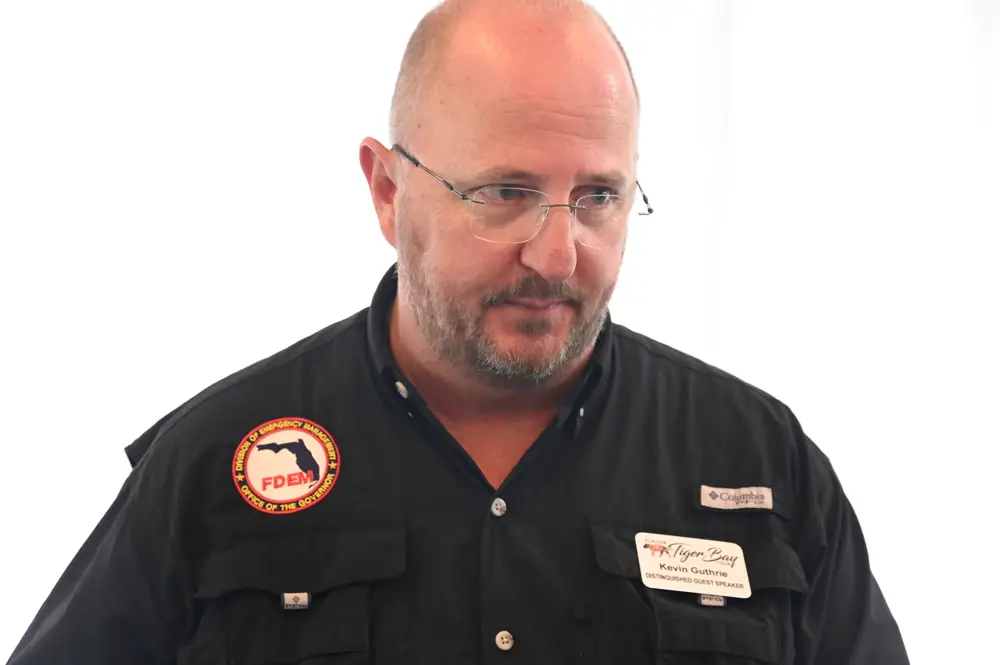
As director of the Florida Division of Emergency Management since April 2021, Kevin Guthrie–who was Flagler County’s emergency management director between 2013 and 2016–has run point on disasters from Category 4 hurricanes to a deadly condominium-building collapse in Surfside.
Guthrie also has been charged with overseeing the evacuation of Floridians from strife-torn Haiti, along with a controversial program to transport migrants to “sanctuary” areas of the country.
The News Service has five questions for Division of Emergency Management Director Kevin Guthrie:
Q: What were your thoughts as AccuWeather recently warned of a busy Atlantic hurricane season, followed by a Colorado State University forecast that the entire list of storm names could be used this year?
GUTHRIE: It was more confirmation of what our own in-house meteorologists were saying, what the local National Weather Service offices were saying. Again, what’s the horrible and terrible? The horrible and terrible is we get hit with four storms. But at the same time, I cannot worry about how many storms we are going to have. My job is to prep this team to be ready to go for a multiple hurricane season. And that’s what we’re doing. We are actually preparing as if we’re going to have the ‘04 season all over again (when multiple hurricanes hit). So, we’re preparing for maybe five storms to hit the state of Florida. You know, figure if we’re ready for that, then we should be good to go. And so, we’re going to make sure that we’re ready with all of our vendors, all of our state emergency-response team members for this hurricane season. And you know, again, we want to hope for the best but prepare for the worst.
Q: What did you learn from state evacuation efforts last year in Israel that you were able to incorporate into ongoing Haiti evacuation missions, and what were the biggest differences that you encountered in Haiti?
GUTHRIE: I’m happy to report that as of Saturday, we’re at 578 Floridians and Americans that have been repatriated back to the United States. What was the most challenging piece at the very beginning of (Haiti) was, we did not have a cooperating government. So, what I mean by that is Israel wanted us to come in and take Floridians and Americans out of the country. So, getting access or, you know, permits to get into and land with our charter aircraft, that was easy to do when you have a cooperative government.
In Haiti, it was much more difficult there because there was no government to cooperate with. The entire government basically collapsed. So we were dealing with individuals that were in control of the airport, giving us permits by the day instead of permits by say, by the week or maybe two weeks. It was very slow going in the very beginning because of the tactics that we were having to use. We were basically having to use tactics of one carload at a time moving in the dead of night, trying to get people across a mountainous jungle terrain to the airport that we were at. One individual said that he came on his own. He said it took him four days to get from Port-au-Prince to the Cap-Haïtien Airport. On a normal day, that’s a seven-hour drive. It took him four days to get there.
Q: Gov. Ron DeSantis and other state defendants last month were dismissed from a federal lawsuit in Massachusetts that challenged Florida’s migrant flights from Texas to Martha’s Vineyard in 2022. The judge did not dismiss allegations against the charter company that handled the flights. Where is the “Unauthorized Alien Transport Program” now, and does the dismissal against the governor mean you can start running some flights again?
GUTHRIE: We were never disallowed to take people in, let’s say, the last nine months. But the state statute, the way it’s written, it must be voluntary for individuals — unauthorized, undocumented aliens with all the proper paperwork — and they volunteer to go. We know that the number-one intended destination for individuals coming out of Haiti, Venezuela, Guatemala, Cuba, is Florida. What’s unfortunate about this situation is trying to find actual volunteers inside the state of Florida that want to relocate to somewhere else. That number is really, really small. We have spent about $700,000 trying to locate people here in the state of Florida that want to relocate. Our product right now has been 10, 12 people, maybe. So, what we’ve done is put a pause on that particular methodology because we don’t want to continue to spend taxpayer dollars to find, you know, really small groups of people. So, we’re re-evaluating our next steps with our vendors to see, where do we go next? Is it back to the southwest (Texas) border? Is it, you know, here in Florida? How do we start to move more people that want to be moved? But even if we’re at the southwest border, it is voluntary to go to the cities that the governor and the staff have identified. So, we’ll continue to work on that, but right now we have no flight on the horizon as we continue to try to find volunteers.
Q: How prepared is your agency for the next pandemic?
GUTHRIE: Right now, we still have three warehouses. The Legislature just signed off on a brand-new warehouse for us that will be able to collapse all those warehouses into one. So, we have one warehouse inside of Lakeland right now that is completely full of PPE (personal protective equipment). We have hundreds of thousands, if not millions, of masks, gloves, goggles, gowns and so on. So, we still have a PPE stock supply. What’s unfortunate about some of that is it was underneath a temporary FDA (U.S. Food and Drug Administration) approval. If the (Biden) administration lets that temporary FDA approval go, then all of that equipment is, you know, for naught. But we don’t see anything on the horizon where the FDA is going to let what they call the emergency-use authority go. So as long as that emergency-use authority stays intact, we’ll be OK to respond to the next pandemic.
Q: Have you decided how long you can keep running the agency?
GUTHRIE: I told my staff that right now I’m guaranteed two years and six months with the (DeSantis) administration. I like to think that the job that Kevin Guthrie is doing with the Division of Emergency Management is good and I’ll be looked at by the next administration on my own merits.
–News Service of Florida




























Joe D says
All these plans sound GREAT, EXCEPT having ALL the emergency and Personal Protection Equipment stored in ONE central warehouse. As a Clinical Nurse Specialist and a Certified Nurse Case Manager recently retired from a major East Coast University Teaching Hospital, having ONLY one central warehouse puts the ENTIRE supply in danger: Fire? Local disaster? Sabotage? Roof leakage? Flooding?
It makes a better plan to at least have the supplies divided into at least TWO storage warehouses to avoid damage to the ENTIRE supply
Ron Young says
The nurse is correct I am retired first responder Police Officer from NY and post 9-11-01. Never ever do you keep all your eggs in one basket not a good idea you have to think outside the box with a master plan and also have a second plan and then the third plan as we all is Whiskey Tango Foxtrot. Stay safe
The Voice Of Reason says
Great. We have a governor and surgeon general that think masks are worthless. That’s reassuring. More people died in Florida than needed to. Same with vaccines. Florida, where the ignorant go to live, die, govern and vote for trump go during the pandemic.
Concerned Citizen says
Flagler County did all it could to run Guthrie out of here. Looks like he’s had quite a career since leaving.